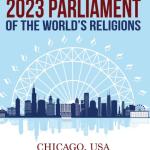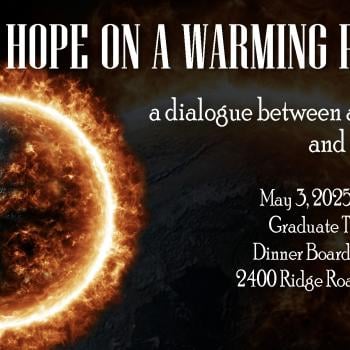How Big is God?

“How big is God?” is a question asked by astrophysicists Michael Summers and Grace Wolf-Chase along with radiation biologist Gayle Woloschak here at the 2023 Parliament of the World’s Religions in Chicago. These scientists have been brought to the Parliament by IRAS (Institute on Religion in An Age of Science). Why? Because the integration of the world as seen through the lenses of science is vital as a reality test for those who see the world through the lenses of religion.
What I like and deem important in the contributions of Grace and Michael along with Gayle is this: these scientists draw out the implications of the doctrine of creation in the Bible for our new understanding of the universe as 13.7 billion years old and containing more than a trillion galaxies. Some of these galaxies have stars with planets. We may have extraterrestrial neighbors on a hundred billion exoplanets within our galaxy alone, the Milky Way. If the creation is big, then is the God of Israel that big too? Or even bigger? Nothing smaller will do.
The Beyond and the Intimate
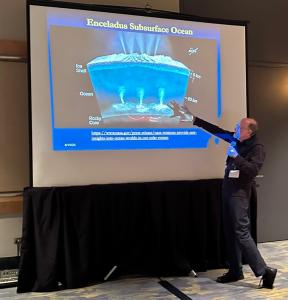
I have contended for some time that, when it comes to our religious sensibilities, symbols of the divine must trigger within us a sense that God is both Beyond and Intimate. If either of these two are missing, then we are not experiencing or thinking about the true God. The speculative theological work of our astrophysicists rightly trigger the Beyond sensibility. They’re earning an honest living, so to speak.
In another post I’m preparing, “Does God exist?”, I lift up St. Anselm as an example of a theologian who understands the question: how big is God? Anselm served as Archbishop of Canterbury in England from 1093 to 1109 AD. Anselm defined God as “That than which nothing greater can be conceived.” If you can conceive of something greater than God, then that’s not the true God. This was Anselm’s logic. It’s Anselm’s way of saying there is nothing beyond God.
As you notice, Anselm is not talking about Zeus, Vishnu, or an earth-mother goddess let alone the “Almighty Dollar.” God, for Anselm is not one being among others. God is the ground and source of the existence of everything that exists. Because God is the source of everything that exists, God in Godself is beyond existing.
How big is God in light of the cosmos as creation?
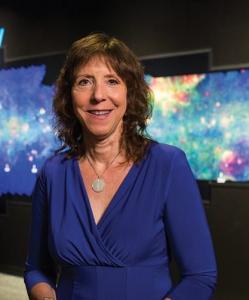
The biblical psalmist intuitively responded to the Beyond sensibility in paradoxical relationship to the intimate, to God’s care for us.
When I look at your heavens, the work of your fingers,
the moon and the stars that you have established;
what are human beings that you are mindful of them,
mortals that you care for them? (Psalm 8:3-4)
Today, thanks to our telescopes, the size of the moon and stars as well as the distance between them is much bigger. How big is God? Bigger than the moon and the stars and the distances between them. That’s what astrophysicists becoming astrotheologians rightly tell us.
From Astrophysics to Astrotheology
We at CTNS (Center for Theology and the Natural Sciences) in Berkeley have been developing the field of astrotheology to speak to the question: how big is God? We recently published a book that includes essays by scientists and theologians from multiple traditions: Christian, Jewish, Muslim, and naturalist.

Conclusion
How big is God? The God of Israel is that than which nothing greater can be conceived. God rides into our consciousness on the Beyond sensibility.
Oh, yes, God cares for us too. God provides food in due season. And God speaks to us from within the deepest recesses of our souls. God rides into our consciousness on the Intimate sensibility as well.
Here’s the series from the site of the 2023 Parliament of the World’s Religions
2023 Parliament of the World’s Religions: Ultimate Unity
2023 Parliament of the World’s Religions: Planetary Hugs
2023 Parliament of the World’s Religions: How Big is God?
2023 Parliament of the World’s Religions: Food Insecurity
2023 Parliament of the World’s Religions: Gaia’s Wizard
2023 Parliament of the World’s Religions: How big is God?
▓
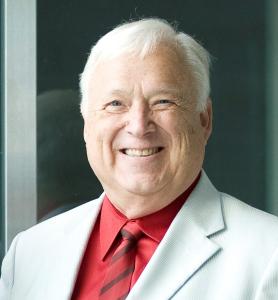
Ted Peters is Distinguished Research Professor Emeritus of Symstematic Theology and Ethics at Pacific Lutheran Theological Seminary and the Graduate Theological Union. Along with Robert John Russell he co-edits the journal, Theology and Science, published by CTNS. He is author of Playing God? Genetic Determinism and Human Freedom (Routledge, 2nd ed., 2002) plus a single volume systematic theology, God—The World’s Future (Fortress, 3rd ed., 2015). Along with evolutionary virologist Martinez Hewlett, he has co-authored three books on the evolution controversy. Peters’ edited and co-edited books such as AI and IA: Utopia or Extinction? (ATF 2019) and The CRISPR Revolution (forthcoming Praeger 2023) explore technological and ethical scenarios that alert us to the need for public policy formulation before matters get out of hand. Ted has just published a new book, The Voice of Public Theology, with ATF (2023). Visit his website, TedsTimelyTake.com and his Patheos blog site on Public Theology.
▓



